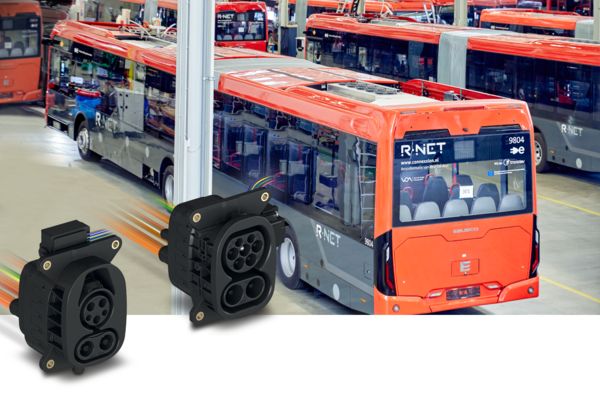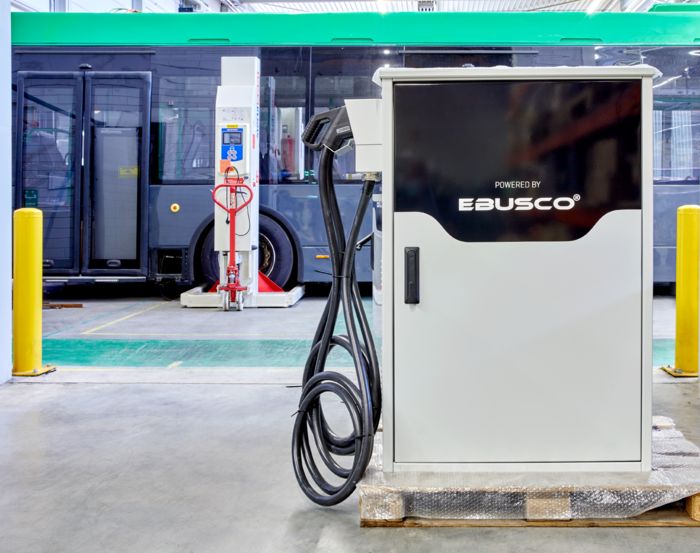Electric bus manufacturer relies on CCS charging inlets from Phoenix Contact Ebusco installs vehicle charging inlets from Phoenix Contact in its electric buses and thus relies on high-quality charging technology for high ranges and short charging breaks.

Overview
- Dutch manufacturer Ebusco has been producing electric buses since 2012. Since then, hundreds of vehicles have been commissioned.
- In passenger transport as well, the market demands high ranges and the ability to recharge quickly on the move.
- CHARX connect vehicle charging inlets from Phoenix Contact, which can be used to achieve a permanent 250 kW and higher charging powers of up to 500 kW for short periods, satisfy this requirement.
- In the future, it will also be important to optimize charging processes in the utility vehicle sector. Ebusco is already working on the automation of bus depots and robotic charging processes.

Ebusco develops, manufactures, and assembles its 3rd generation electric buses entirely in the Netherlands
Customer profile
The Dutch electric bus manufacturer Ebusco presented its first electric bus model, the Ebusco 1.0, at the IAA Utility Vehicles trade fair back in 2012, the year the company was founded. Since then, hundreds of vehicles have been commissioned. Requirements are also becoming more rigorous in electrified passenger transportation: Powerful batteries require innovative charging technology.

CHARX connect CCS charging sockets from Phoenix Contact enable high charging powers for commercial vehicles: a constant power of 250 kW and temporary power of up to 500 kW
Application
The rest periods in the bus depot are usually sufficient for charging the batteries of electric buses in everyday life. However, for long distances or wintry outdoor temperatures, there must also be a way to quickly recharge buses outside of their rest periods. The duration of the charging process not only plays a role in the profitable use of the vehicles, but also in the longevity of the batteries. The more balanced the charge, the more cycles the battery can go through.
The vehicle charging inlet used must be suitable for the high charging powers in the utility vehicle sector. To this end, Ebusco relies on innovative technology from Phoenix Contact.

Delivered to customers as a complete system: Electric buses with DC charging stations for intermediate fast charging
Solution
Ebusco has been able to increase the ranges of its electric buses not only through lightweight construction, but also through improved battery technology. The company uses high-quality, long-life batteries with LFP (lithium iron phosphate) technology, which are assembled and optimized in terms of performance depending on the desired range.
Powerful batteries, in turn, require innovative charging technology: Here, the company relies on the CHARX connect CCS charging inlets from Phoenix Contact. They enable a safe charging process with temporary charging powers of up to 500 kW. The high-precision temperature sensor technology on both DC power contacts and the communication of measured data prevent overheating within the vehicle charging inlet even with high charging currents. In addition, the charging current can be controlled by the temperature measurement data on the vehicle side, so that the maximum possible charging current is always used. The optimized connection technology between the DC power contacts and the high-voltage cables also reduces heating of the connection system.
Beyond the vehicle, a dedicated charging station from Ebusco complements the optimized overall package. The electric bus manufacturer produces charging stations specifically designed to meet the needs of the heavy battery packs. These charging stations also contain charging cables and power electronics from Phoenix Contact. A complete solution consisting of innovative charging and battery technology ensures an optimized charging process.
Summary
In the future, it will also be important to optimize charging processes in the utility vehicle sector. Ebusco is already involved in the automation of bus depots. Here, an innovative robot automatically guides the robust CCS charging connector from Phoenix Contact to the bus and connects it to the vehicle charging inlet. This technology not only saves time and is reliable, but is also the benchmark for future-oriented charging processes with regard to autonomous driving. High product quality is crucial for safety in automated charging.

